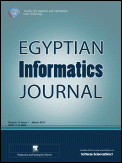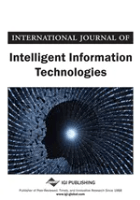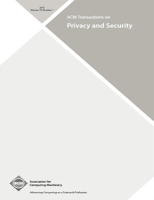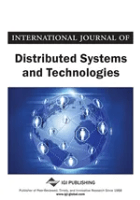
Egyptian Informatics Journal
Scope & Guideline
Connecting Scholars through Groundbreaking Research
Introduction
Aims and Scopes
- Cybersecurity and Threat Detection:
The journal extensively covers methodologies for detecting and mitigating cybersecurity threats, including DDoS attacks, malware detection, and intrusion detection systems, emphasizing the use of machine learning and AI-driven techniques. - Machine Learning and Artificial Intelligence:
A significant focus is placed on the application of machine learning algorithms across various domains, such as healthcare, IoT, and smart city technologies, showcasing advancements in predictive modeling, classification, and optimization. - IoT and Edge Computing:
Research related to the Internet of Things (IoT) and edge computing architectures is prevalent, addressing security, data management, and optimization strategies for connected devices. - Data Analytics and Management:
The journal explores data-driven approaches, including data fusion, clustering, and big data analytics, aimed at improving decision-making processes in various sectors. - Blockchain Technology:
Blockchain applications in areas such as security, data management, and healthcare are discussed, highlighting innovative solutions for enhancing trust and transparency in digital transactions. - Healthcare Informatics:
There is a notable emphasis on healthcare-related research, particularly in the application of informatics for disease detection, patient monitoring, and medical image processing. - Smart Cities and Urban Computing:
The journal addresses the challenges and solutions related to smart city technologies, focusing on traffic management, resource optimization, and sustainable urban development.
Trending and Emerging
- Federated Learning and Privacy-Preserving Techniques:
There is a rising interest in federated learning and privacy-preserving methodologies, particularly in the context of IoT and healthcare applications, as researchers aim to enhance data security while maintaining collaborative learning. - Advanced Machine Learning Applications:
Recent publications highlight the application of advanced machine learning techniques, such as deep learning and reinforcement learning, across various domains, indicating a trend towards more sophisticated and capable AI systems. - AI in Healthcare:
The integration of AI technologies in healthcare, especially for disease prediction, diagnosis, and treatment optimization, is becoming increasingly prominent, driven by the demand for more efficient healthcare solutions. - Cyber-Physical Systems and Smart Environments:
Research on cyber-physical systems, particularly in smart environments and cities, is gaining momentum as these technologies become essential for urban planning and resource management. - Real-Time Data Processing and Analytics:
There is a growing emphasis on real-time data processing techniques, particularly for applications in IoT and smart devices, reflecting the need for immediate data-driven decision-making. - Ethical AI and Responsible Computing:
Emerging discussions around the ethical implications of AI and responsible computing practices are becoming more frequent, highlighting the need for accountability and transparency in AI technologies.
Declining or Waning
- Traditional Data Encryption Techniques:
Research on conventional encryption methods appears to be decreasing as newer, more advanced cryptographic techniques and frameworks are gaining traction, particularly those leveraging blockchain and AI. - Basic Network Protocols and Architectures:
There is a noticeable decline in publications focused solely on basic networking protocols, as the journal shifts towards more complex, integrated approaches that incorporate cloud computing and IoT. - Static Analysis Tools for Software Security:
The emphasis on static analysis tools is waning in favor of dynamic analysis and real-time security measures, reflecting the need for more adaptive and responsive security solutions. - Theoretical Approaches to Informatics:
Research that focuses primarily on theoretical models without practical applications is becoming less common, as there is a stronger demand for empirical studies and applications in real-world scenarios.
Similar Journals

International Journal of Intelligent Information Technologies
Advancing the Future of Intelligent Decision-Making.Founded in 2005, the International Journal of Intelligent Information Technologies serves as a pivotal platform for the dissemination of cutting-edge research in the fields of decision sciences and information systems. Published by IGI Global, this journal is dedicated to advancing the understanding of intelligent systems, data analytics, and technological innovations that drive modern decision-making processes. With an ISSN of 1548-3657 and an E-ISSN of 1548-3665, the journal is indexed strategically to ensure visibility among academia and industry professionals. Although it currently holds a ranking in the Q4 quartile of both decision sciences and information systems categories in 2023, it stands out for its comprehensive investigations into best practices and emerging trends in intelligent information technologies. It aims to provide readers with rigorous, peer-reviewed articles that offer practical insights and theoretical frameworks to facilitate informed decision-making in an increasingly data-driven world. Its commitment to quality research makes it an invaluable resource for researchers, professionals, and students alike who are eager to explore new dimensions of technology-assisted decision-making.

ACM Transactions on Privacy and Security
Exploring New Frontiers in Cybersecurity.ACM Transactions on Privacy and Security, published by the Association for Computing Machinery, is a prestigious journal dedicated to the field of computer science, with a particular focus on privacy and security in modern computing environments. Since its inception in 2016, this journal has become a vital resource for researchers, professionals, and students alike, addressing the increasing concerns surrounding data protection and risk management. With an impressive impact factor and recognition as a Q1 journal in both Computer Science (Miscellaneous) and Safety, Risk, Reliability and Quality, it ranks among the top publications in its field, positioned at the 73rd percentile in General Computer Science and the 71st percentile in Engineering. The journal’s Open Access options enhance accessibility to cutting-edge research, fostering collaboration and innovation in the rapidly evolving landscape of privacy and security. Readers can expect high-quality peer-reviewed articles that contribute significantly to both theoretical and practical advancements in technology and data security.

JOURNAL OF INFORMATION SCIENCE AND ENGINEERING
Transforming Ideas into Innovative Solutions.JOURNAL OF INFORMATION SCIENCE AND ENGINEERING, published by the Institute of Information Science in Taiwan, is a pivotal platform for the dissemination of innovative research in the multidisciplinary fields of information science and engineering. Established in 1993, the journal primarily focuses on areas such as library and information sciences, human-computer interaction, hardware and architecture, as well as computational theory and software development. Despite holding a current Q4 ranking in several categories, the journal demonstrates significant potential for growth, particularly in computation and software systems, as evidenced by its Scopus rankings and percentiles. Researchers, professionals, and students will find this journal to be an invaluable resource to stay abreast of evolving theories and technologies in information science. The journal is accessible through traditional subscription models, fostering a broad academic outreach. It serves to enhance knowledge-sharing and collaboration within this dynamic and ever-evolving field.

COMPUTING AND INFORMATICS
Transforming Ideas into Technological AdvancementsCOMPUTING AND INFORMATICS is a peer-reviewed academic journal published by the Slovak Academy of Sciences Institute of Informatics, focusing on various aspects of computer science and its applications. Established in 2000, this journal has garnered attention for its emphasis on computational theory, computer networks, software development, and hardware architecture, placing it in the competitive landscape of academic publishing with currently a Q3 ranking in the fields of Computational Theory and Mathematics, and Computer Networks and Communications, as well as Q4 ranking in Software and Hardware and Architecture categories. Readers can access its findings through Open Access, promoting wider dissemination of innovative research. With an ISSN of 1335-9150 and an E-ISSN of 1335-9150, the journal serves as a vital platform for showcasing cutting-edge research in the field, aiming to bridge theoretical foundations with practical applications. This journal not only contributes to the academic community but also supports the ongoing advancements in technology and informatics, making it an important resource for researchers, professionals, and students keen on staying at the forefront of the field.

Frontiers in Computer Science
Fostering collaboration for groundbreaking advancements in technology.Frontiers in Computer Science is a premier open-access journal published by Frontiers Media SA that has rapidly established itself as a prominent platform for scholarly research in the diverse and evolving field of computer science. With a notable impact factor reflecting its high citation rates, this journal aims to disseminate innovative findings and groundbreaking studies across multiple subdisciplines, including Computer Science Applications, Computer Vision and Pattern Recognition, and Human-Computer Interaction. Since its inception in 2019, and with a consistent trajectory from 2019 to 2024, it has garnered accolades, achieving Q2 ranking in several categories and an impressive Q1 in miscellaneous areas of computer science. Researchers, professionals, and students alike are encouraged to contribute to this dynamic journal that serves as a vital resource for advancing knowledge and fostering collaborative dialogue in the global computer science community. Frontiers in Computer Science is committed to providing open access to research, promoting unrestricted sharing of ideas and fostering innovation at the intersection of technology and society.

Journal of Internet Technology
Fostering Collaboration in the Digital AgeThe Journal of Internet Technology (ISSN: 1607-9264, E-ISSN: 2079-4029) is a leading academic publication, fostered by the LIBRARY & INFORMATION CENTER at National Dong Hwa University, Taiwan. Established in 2004, the journal has become an essential resource for researchers, professionals, and students in the fields of Computer Networks and Communications and Software Development, achieving a commendable Q3 ranking in both categories as of 2023. With an impressive track record extending to 2024, the journal offers a platform for disseminating high-quality research and innovative ideas. Notably, it ranks #212 out of 395 in Computer Networks and Communications and #251 out of 407 in Software as per Scopus metrics. The journal remains committed to advancing knowledge and fostering interdisciplinary collaboration in the rapidly evolving digital landscape, making it a vital tool for those looking to stay at the forefront of internet technology research.

Cluster Computing-The Journal of Networks Software Tools and Applications
Transforming Technology through Insightful ResearchCluster Computing - The Journal of Networks Software Tools and Applications, published by Springer, is a premier academic journal catering to the vibrant fields of computer networks and software technologies. With an impressive impact factor and recognized as a Q1 journal in both Computer Networks and Communications and Software categories for 2023, it ranks within the top echelons of its field, boasting a Scopus rank of #50 out of 395 and #59 out of 407 respectively, highlighting its influence and reach. The journal, which has been in continuous publication since 2005, serves as a vital platform for groundbreaking research, offering insightful articles and tools that drive innovation in network computing. Researchers, professionals, and students are invited to contribute to and benefit from the dynamic discourse presented in this journal, which is pivotal for advancing knowledge and enhancing practical applications in a rapidly evolving technological landscape.

International Journal of Distributed Systems and Technologies
Driving Impactful Discoveries in Distributed Systems.Welcome to the International Journal of Distributed Systems and Technologies, a prominent academic platform published by IGI Global dedicated to advancing the field of distributed systems and technologies. With an ISSN of 1947-3532 and an E-ISSN of 1947-3540, this journal, established in 2010 and continuing through 2024, offers a unique venue for researchers, professionals, and students to disseminate their findings in the realms of computer networks, communications, hardware, and architecture. Despite its current placement in the Q4 quartile for both computer networks and communications and hardware and architecture categories in 2023, the journal is committed to fostering innovative solutions and interdisciplinary collaboration that can drive future advancements. Although not open access, contributions to this journal not only receive rigorous peer review but also have the potential to significantly impact the community, underscored by a focus on applicable research that addresses the emerging challenges in technology. As part of a rich repository, the journal invites you to explore its latest issues and join in shaping the future of distributed systems.

Internet of Things
Illuminating the Path of Technological AdvancementInternet of Things is a cutting-edge academic journal dedicated to the rapidly evolving field of interconnected devices and systems, published by Elsevier. Established in 2018, this journal has quickly ascended to prominence, achieving Q1 rankings across multiple disciplines including Artificial Intelligence, Computer Science Applications, and Engineering in its 2023 assessments. With its ISSN 2543-1536 and E-ISSN 2542-6605, it serves as a pivotal platform for researchers and professionals alike to disseminate innovative research findings, case studies, and reviews that address the complexities and opportunities within the IoT landscape. The journal’s impressive Scopus rankings further underline its significance, with notable placements in highly competitive categories. Although it operates under traditional publishing models, ensuring thorough peer review and academic rigor, Internet of Things remains at the forefront of technological discourse, facilitating knowledge exchange and collaboration among its audience. For those engaged in the dynamic fields of technology and innovation, this journal is an essential resource for up-to-date research and practical insights.

Information Technology and Control
Driving excellence in information technology and systems.Information Technology and Control, published by Kaunas University of Technology, is a prominent open access journal dedicated to the fields of computer science, control and systems engineering, and electrical and electronic engineering. With an ISSN of 1392-124X and a notable reputation, the journal has continuously contributed to the dissemination of innovative research since its establishment in 2008. As of 2023, it ranks in the Q3 quartile for Computer Science Applications and in the Q2 quartile for both Control and Systems Engineering and Electrical and Electronic Engineering, reflecting its growing influence in these disciplines. The journal provides a platform for the latest developments in technologies driving the industry forward and encourages an interdisciplinary approach to problem-solving. With open-access solutions implemented in 2020, it ensures that research findings are readily accessible to a global audience, supporting knowledge transfer and collaboration among researchers, professionals, and students alike. This inaugural introduction underscores the journal's commitment to fostering innovation and excellence in the rapidly evolving landscape of information technology and control.